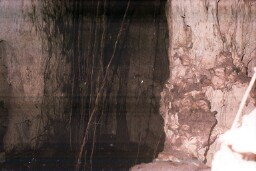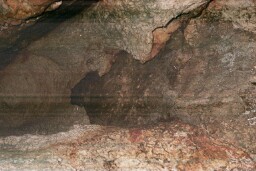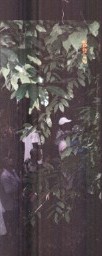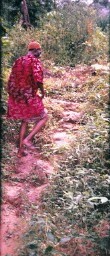 |
 |
 |
 |
| Inside the Cave Temple Complex of Chukwu Abiama and Ibin Ukpabi |
| There is a Temple Complex with a Chamber Presence of God in Igboland. It is a rare and surprising find. This is because the Igboland of Nigeria is a place where every traditional village or town has sacred structures built and spaces domesticated for tutelary spirits and other divinities, but none for God--Chukwu (The Great Spirit). In fact, in Igbo ontology, the absence of any religious architecture specifically built for Chukwu is based upon the Igbo belief that the Great Spirit, in relation to the other divinities or supernatural entities, is so incomprehensibly huge in size and incredibly multidimensional that the Igbo people do not even begin to contemplate building a house for him. Hence, it was quite astonishing to me to arrive at the dark Chamber Presence to which Igbo people in the past went, and some still go to feel the awesome presence of God. |
| Historical Background |
| In pre-colonial times, oblation and propitiation
rites were performed there for the Chukwu--The Great Spirit. The
dark Chamber Presence of Chukwu together with the Oracle of Ibin Ukpabi
in the Temple once served as the highest court in Igboland. Major
criminal offenses and appeals to judgments on petty crimes were taken to
Chukwu Abiama (Great and All-Knowing God) to hear and pass judgments through
the Oracle. Those found guilty were either sold into slavery or put
to death depending upon the degree of their offense and the judgments of
Chukwu. Those who received the death penalty were ritually killed
and their blood colored the running stream in the cave red (hence the River
of Blood).
During the period of the transatlantic slave trade, the people of Arochukwu whose name literally means the Aro of God (as in Aro [people] of Chukwu [God]), took control of the hidden location of the Cave Temple Complex and used it to their economic and political advantage. From the 17th through 19th centuries, the Aro extended the religious and judicial infuence of Chukwu by establishing oracular shrines of Ibin Ukpabi in many villages and towns in Igboland. They also established trading posts and slaveholding quarters in many towns and villages in the Aro Diaspora. Hence, there is a direct link between Aro quarters or concentric communities in Igboland and the busiest slave trading locations in the Igbo hinterland. The subsidiary oracular shrines of Ibin Ukpabi in the Aro Diaspora became a part of the traditional judicial system of Igboland. The Aro expectedly became principal participants in the settling of disputes. They decided when it was necessary to take cases from the Aro Diaspora to the main Oracle and the Chamber Presence in their ancestral hometown of Arochukwu. Thus the Temple Complex in Arochukwu gradually became something like the Supreme Court of Igboland. And the Aro people of God had enormous influence in the area of traditional administration and politics in the interior of Igboland. |
| The British Military Expedition of 1901 to 1902 |
| It took the British might, at the turn of the 20th century, to stop Aro imperial domination and economic control of the then impenetrable Igbo interior. The British Colonial Administration carried out a military expedition from 1901 to 1902. The mandate of soldiers was to destroy the Oracular Shrine together with the Oracle of Ibin Ukpabi in Arochukwu, which was decidedly the source of Aro imperial influence. The British claimed that they destroyed the Temple Complex and people believed that to be the case. And believing that the Temple Complex was indeed destroyed by the British soldiers, Igbo people stopped taking cases to the Chamber Presence. Due to these events, the religious and political influence that the Aro had over the Igboland was drastically reduced. |
| The Best-Kept Secret of the Arochukwu |
| However, as is evident from what has been discussed thus far, the Temple Complex or the Oracle (the "Long Juju") was not destroyed. And the Aro, using their surpassing diplomacy and extraordinary tact, secretly preserved the Okonto, the sacred jungle where the Temple Complex and abode of Chukwu is located. From 1902, the Aro barred even Aro indigenes from entering the Okonto. Since then, the Oracle of Ibin Ukpabi and the Chamber Presence of Chukwu have remained the best-kept secret of the people of Arochukwu. Therefore, Aro escorts, either because they were forbidden from doing so or as a part of their traditional know-nothing mechanism of secrecy, simply would not talk to scholars about the so-called "Long Juju." And for some reason scholars worked under the assumption that they were not to ask such questions. To the rest of the Igbo people of Nigeria, including the Aro Diaspora, the Oracle of Ibin Ukpabi or "Long Juju" has remained (and still remains) a mystery. To some, the "Long Juju" is a myth; to others, it has become a legend in their minds. |
 |
 |
| In the Jungle of Chukwu Abiama | Forest Trail and slave route in the Cave Temple Complex of Chukwu Abiama |
| The truth is that tunnels of disappearance led to outlets in the former slave trade routes in the border villages for onward transmission by boats to the port in Calabar. From here thousands of enslaved Africans were shipped to the Americas. |
| Back to Arochukwu Page |